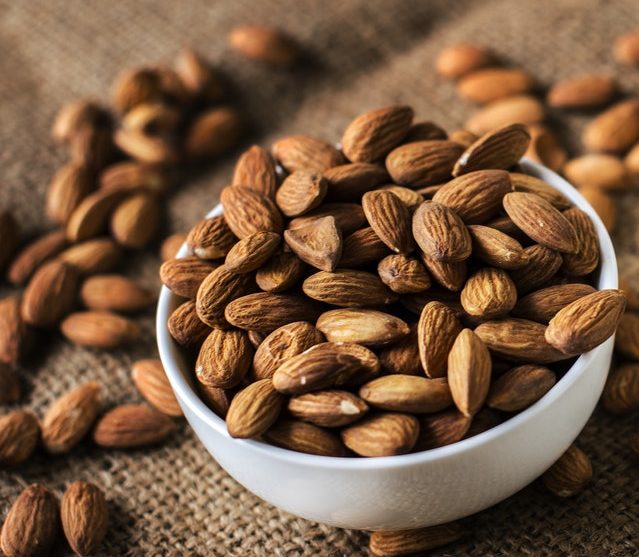What Will Happen If You Eat 20 Almonds Every Day?
You probably know that eating almonds (and nuts in general) is a great way to get healthy fat into your diet. Nuts are also generally high in protein, so they assist in muscle building and provide the kind of slow-burning energy that can keep you going all day. Turns out, the humble almond can do a lot more than that.
So what happens if you eat almonds every day? Read on to find out about the incredible health benefits of consuming a handful of these nuts on the regular.
Why 20 almonds?
For the purposes of our analysis, we chose 20 almonds as a daily recommendation because it adds up to about an ounce. In one ounce of almonds you will get 163 calories ( the accepted amount, though there is some evidence that it may be closer to 129 calories), 5 grams of protein, 12 grams of mostly unsaturated fat, 3 grams of fiber, and less than one gram of sugar. One ounce of almonds can be a satisfying and nutritious snack or a smart addition to breakfast oatmeal, lunch salad, or dinner casserole.

Improve Digestive Health
One of the newer pieces of understanding about the health benefit of almonds relates to digestive health. Eating 20 almonds every day has been shown to produce significant changes in the gut microbiota. Healthy intestinal bacteria, like lactic acid and bifidobacteria, serve to maintain a strong intestinal barrier that keeps the bad bacteria out.
Bad bacteria that crosses the intestinal barrier tends to cause chronic inflammation that is linked to all sorts of ailments, including type 2 diabetes, heart disease, mental health problems, asthma and chronic sinus infections, skin problems, Parkinson’s disease, and even cancer. It’s shocking to realize how many bodily ills originate in the gut.

Feel Full Longer
The nutritional package delivered by one ounce of almonds is perfect to fulfill a snack craving and prevent overeating later. The protein, fiber, and fat work together to keep you feeling full and satisfied, while the diverse profile of vitamins and minerals gives your body what it needs to perform optimally. The biggest hurdle in maintaining a healthy caloric intake each day is eating foods that actually keep you feeling satisfied, or else a binge is sure to occur at some point.
One great tip for improving your satiety from eating almonds is to chew them longer. A 2009 study in the American Journal of Clinical Nutrition found that thorough chewing broke down the cell walls of almonds in such a way that the nutrients were better absorbed.
Achieve Your RDA for Riboflavin and Vitamin E
Riboflavin is a critical nutrient that is thought to help prevent all kinds of physical troubles, including migraines, acne, muscle cramps, carpal tunnel syndrome, cervical cancer, and some blood disorders. Eating 20 almonds per day will net you about 1/5 of your recommended daily allowance. (Get the rest from foods like steak, pork, eggs, avocado, milk, and spinach.) Vitamin E is an antioxidant that can improve heart health and support the immune system, not to mention the smooth skin and shiny hair you’ll get. One ounce of almonds offers almost half of your RDA for vitamin E. Other great sources of vitamin E include seafood, fruit (kiwi, mango, blackberry, apricot, and avocado) and veggies like broccoli, red sweet pepper, spinach, and asparagus.
Increase Your Metabolism
Twenty almonds also contain small amounts of the metabolism-boosting B-complex vitamins thiamine, niacin, vitamin B6, and folate. The exact mechanism is not known, but research indicates that regular consumption of almonds provides up to a 15% boost in your metabolism rate. That leads to increased fat burning and a trimmer waist, something we all want.
Keep Your Bones Strong
Snacking on 20 almonds a day can help maintain strong bones. Doing so provides about 20% of your daily requirement of magnesium and phosphorus. These nutrients work together to increase bone density.
You’ll also get a small amount of calcium, the very building block of bones. Recent studies have additionally considered the role of vitamin E in bone density and strength, yet another of E’s benefits.
Improve Heart Health
Eating 20 almonds a day may help keep your heart healthy. One way they help is by lowering LDL, the bad cholesterol that can lead to plaque build-up in your blood vessels. Almonds have also been linked to a reduction in chronic inflammation that is a major contributor to heart disease. Nuts in general appear to improve conditions in the lining of arteries and may also reduce your risk of blood clots, which can cause a fatal heart attack. The heart-healthy ingredients in almonds include unsaturated fats, omega-3 fatty acids, fiber, plant sterols, l-arginine, and vitamin E.
Lower Cholesterol
Improved heart health and lower cholesterol go hand-in-hand, but you can boost the cholesterol-lowering effects of eating almonds by leaving the skins on. Almond skin has been found to contain flavonoids, which are plant-based pigments that have anti-inflammatory and antioxidant properties. Flavonoids are thought to work with the vitamin E and vitamin C content of the nuts to increase the effectiveness of antioxidants and lower LDL levels.




